Affiliation: College of Agricultural Sciences

Tom Allen Oral History Interview
Life history interview conducted by Chris Petersen and Karl McCreary.
September 1, 2015
Tom Allen (b. 1931) was a Botany professor at OSU from 1962 to his retirement in 1991.
Shortly after arriving on campus, Allen acquired the university's first electron microscope
and used it to study viruses in lilies, among many other plants. Allen is also an
artist of regional consequence who is especially well-known for his watercolor paintings.
While at OSU, Allen helped to found both the Corvallis Art Center as well as the Watercolor
Society of Oregon. He also led the annual Art About Agriculture juried competition
and traveling exhibit for more than twenty years. In his interview, Allen discusses
his evolution as a scientist and artist; shares his institutional memories of Botany
and agriculture at OSU; and reflects on his important involvement in the art community
in Corvallis and across Oregon.

Roy Arnold Oral History Interview
Life history interview conducted by Adam LaMascus.
September 6, 2013
Roy Arnold (b. 1941), a native of Nebraska, completed both a master's degree and a
doctorate at Oregon State University in Food Science. For twenty years a faculty member
at the University of Nebraska, Arnold came back to OSU in 1987 and, over nineteen
more years, served in numerous roles including Dean of the College of Agriculture
and University Provost. During his tenure as an upper administrator, Arnold oversaw
many of the reductions that were put in place as a result of the passage of the Ballot
Measure 5 property tax limitation initiative. He also pushed forward a number of new
initiatives at OSU - the University Honors College, the Ethnic Studies department,
and a dual admissions/dual enrollment program with Oregon's community colleges were
all formed during his years as provost. His interview covers the breadth of his career,
focusing primarily upon his long associations with the University of Nebraska and
Oregon State University.

George Arscott Oral History Interviews
Two life history interviews conducted by Chris Petersen.
December 5, 2014
George Arscott (b. 1923) is an alumnus of and an emeritus faculty member at Oregon
State. A veteran of both World War II and the Korean War, Arscott completed his bachelor's
degree in Poultry Husbandry in 1949, and was a member of the Poultry Science faculty
from 1953 to his retirement in 1987. An accomplished researcher and expert in poultry
nutrition, Arscott chaired Poultry Science for eighteen years, a time period during
which a new poultry facility was built at OSU, and an era that also saw nearly all
of the department's faculty participate in a five-year poultry extension and training
program in the Yemen Arab Republic. In retirement, Arscott continued to serve internationally,
consulting on poultry operations in Central and South America, Egypt, and Lithuania.
Over two interviews, Arscott shares his memories of his military service, his research
and progression through academia, and the activities of the Poultry Science department
over his five decades of affiliation.

Mike Beilstein Oral History Interview
Life history interview conducted by Chris Petersen.
July 7, 2016
Mike Beilstein (b. 1951) is an OSU alum who was a member of the university's first
undergraduate cohort in Biochemistry & Biophysics, completing his degree in 1973.
After a two-year stint in the Peace Corps and two additional years of work and political
engagement in the Washington, D.C. area, Beilstein returned to Corvallis and spent
the next two decades researching selenium deficiency in the laboratory of Philip Whanger,
an OSU professor of Agricultural Chemistry. In the early 1990s, Beilstein also returned
to political activism, helping to lead a successful living wage campaign and ultimately
serving for six terms as a member of the Corvallis city council. Retired from OSU
in 2007, Beilstein is heavily involved with a number of environmental and social justice
groups including, for a number of years, an annual trip to Cuba in protest of the
United States trade and travel ban. His interview details his OSU student experience
in the early 1970s; the influential two years that he spent as a Peace Corps volunteer
in Lesotho; his research career at Oregon State; and his years of political activism
and public service.
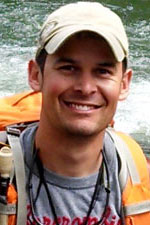
Jerimiah Bonifer Oral History Interview
Life history interview conducted by Chris Petersen.
November 22, 2014
Jerimiah Bonifer (b. 1983) is a member of the Confederated Tribes of the Umatilla
Indian Reservation, who grew up on the reservation and in nearby Pendleton, Oregon.
From 2009-2014, while living in Pendleton and working full-time, Bonifer attended
OSU through its Extended Campus online degree program, studying Fisheries and Wildlife.
Bonifer completed his undergraduate work in 2014; his participation in commencement
exercises that Spring at Reser Stadium marked his second ever visit to OSU's Corvallis
campus. His interview focuses on his traditional tribal upbringing, his Ecampus experience,
and his professional work in fisheries.

Carl and Kim Casale Oral History Interview
Life history interview conducted by Chris Petersen.
November 6, 2015
Carl Casale (b. 1961) and his wife Kim (Martin) Casale both graduated from OSU in
1983 with degrees in Agricultural Economics. In the years that followed, Carl moved
up the executive ranks at the Monsanto Corporation, ultimately rising to the position
of Chief Financial Officer. Kim enjoyed career growth as well, eventually becoming
an Area Director at Bristol-Myer Squibb. In 2011, Carl accepted the position of Chief
Executive Officer and President of CHS, Inc., the nation's largest agricultural cooperative
and a Fortune 100 company. Though based in Minnesota, the Casales also own and operate
a 100-acre blueberry farm near Aurora, Oregon, which they manage, in part, through
cutting-edge precision agriculture technologies. Their wide-ranging interview touches
upon their OSU experiences; their career trajectories; Carl's life as a chief executive;
their blueberry farm; and their continuing connections with OSU.

Emery Castle Oral History Interviews
Three life history interviews conducted by Chris Petersen.
October 14 - 15, 2014
Emery Castle (b. 1923), a widely respected agricultural economist, made a significant
impact on Oregon State University over four decades of service. At various points
the chair of the Agricultural Economics department, the Dean of the Graduate School,
and the head of the University Graduate Faculty of Economics, Castle was also one
of three co-chairs of the Commission on University Goals, a group that played an important
role in shaping the strategic agenda of the university in the early 1970s. A major
contributor to conversations on natural resources and the rural economy, Castle also
led a Washington, D.C.-based public policy think tank, Resources for the Future, from
1976-1986, before returning to Corvallis for the final seven years of his career.
In three interviews, Castle discusses his education and service during World War II;
his scholarly achievements in agricultural economics and rural studies; and his diversity
of experiences as an administrator in Corvallis and elsewhere.

Memories of Clackamas County Extension
Two life history interviews conducted by Mike Dicianna.
November - December 2016
The Oregon State University Extension Service traces its roots in Clackamas County
to 1917, when the service assigned a home economist to the region for the first time.
Today, the Clackamas County office oversees a robust schedule of programming focusing
on trees and forests, 4-H youth, family and community health, home gardening, agriculture,
and watershed health. In anticipation of Clackamas County Extension's one-hundredth
anniversary, two interviews were conducted in 2016 with individuals who maintain close
ties to the region and the office. Merilly Enquist, a 1959 OSC graduate and fourth-generation
descendent of Oregon pioneers, manages timber stands on her family's 300-acre estate
near Molalla, Oregon. Harold Black, a World War II veteran and 1947 OSC Farm Crops
graduate, worked as a 4-H Extension agent and administrator for more than three decades
in Columbia, Clackamas and Multnomah counties.

The Extension Tradition in the Columbia River Gorge
Two life history interviews conducted by Chris Petersen.
August 9, 2016
The Extension and Experiment Station traditions in Oregon's Columbia River Gorge date
back well over one-hundred years to the founding of the Mid-Columbia Experiment Station
in 1913, and the first employment of agricultural agents in Wasco County in 1916 and
Sherman County in 1918. In August 2016, two interviews were conducted with individuals
closely associated with the more modern history of Extension and Experiment Station
efforts across the region. Billie Stevens (b. 1951) is a retired 4-H Extension agent
who served Hood River County from 1985 to 2009. Sandy Macnab (b. 1953) is an OSU alum
who has spent nearly his entire life in Sherman and Wasco Counties, playing a major
role in a wide variety of area Extension efforts since 1979.

Dennis Dimick Oral History Interview
Life history interview conducted by Janice Dilg.
December 15, 2014
Dennis Dimick (b. 1951) graduated from OSU in 1973 with a degree in General Agriculture.
While at Oregon State, Dimick also pursued a growing interest in photojournalism and
eventually built a career as a photographer, reporter and editor at several newspapers.
From 1980 to 2015, Dimick was a staff member at National Geographic, retiring as the magazine's Executive Environment Editor. In 2013, Dimick received
the Joseph A. Sprague Memorial Award, which is the most prestigious honor granted
by the National Press Photographers Association. His interview focuses on his roots
in agriculture, the development of his skillset as a journalist, his memories of National Geographic, and his influential work documenting and reporting on contemporary environmental
issues.

Leon Hubbard Oral History Interview
Life history interview conducted by Chris Petersen.
December 18, 2013
Leon Hubbard (1917-2014), the son of two Oregon Agricultural College graduates, earned
a degree in Horticulture from Oregon State College in 1941. Hubbard was engaged with
agriculture in Oregon for the whole of his life. A well-known and much respected
crop specialist and cannery administrator, Hubbard spent nearly four decades working
for Birds Eye General Foods, the Gresham Berry Growers Cooperative and its successor
organization, Norpac Foods, Inc. His interview focuses on his upbringing in rural
Oregon, his undergraduate experience at OSC, his seven years as an independent farmer,
and his long career as a field representative for agricultural operations in the northern
Willamette Valley.

The Lives of International Students
Three life history interviews conducted by Chris Petersen.
March 3 - 6, 2015
In 2015, Oregon State University served as a home away from home for over 4,000 international
students hailing from 107 different countries. Over the course of three interviews
conducted in March 2015, the experiences and perspectives of four current OSU international
students were recorded, with particular emphasis paid to changing perspectives on
U.S. culture, contrasting systems of education around the world, and the major social
and cultural adjustments required of international students studying at Oregon State.
The international students who shared their stories are Jenny Urbina, a Ph.D. candidate
from Colombia; Kong Zheng Yeang, an undergraduate from Malaysia; Andrea Jara, also
a Ph.D. student from Colombia; and Chidi Okonkwo, a master's candidate from Nigeria.

Bob and Kaety Jacobson Oral History Interview
Life history interview conducted by Mike Dicianna.
January 20, 2015
Bob Jacobson (b. 1939) attended Oregon State as an undergraduate and member of the
Beaver basketball team, graduating with a degree in Business and Technology in 1963.
Three years later, he became the country's first Marine Extension Agent, working with
coastal fishermen and seafood processors, as well as state-wide policymakers, for
nearly three decades. His daughter Kaety Jacobson (b. 1981) is a 2003 OSU graduate
in Natural Resources. In 2005, she too began a career as a Marine Extension Agent,
operating out of her hometown of Newport. In their interview, the Jacobsons reflect
on their closely connected experiences as OSU students and Marine Extension Agents
on Oregon's coast, commenting on the similarities and differences that each has observed
over the decades.

Chris Johns Oral History Interview
Life history interview conducted by Janice Dilg.
December 15, 2014
Chris Johns (b. 1951), a native of Central Point, Oregon, attended OSU from 1970-1974,
studying Agriculture before changing his major to Technical Journalism. A photojournalist
for the OSU student newspaper, Johns went on to become a lauded photographer for several
newspapers and magazines, and was named National Newspaper Photographer of the Year
in 1979. In 1988 Johns began a formal association with National Geographic magazine, where he was hired as a staff photographer, and spent the next two years
living and working in Africa. In the late 1990s, Johns joined the magazine's editorial
staff and, in 2005, he was named Editor in Chief, the ninth such person to hold this
position since the founding of National Geographic in 1888. His interview focuses on the roots of his love for photojournalism and
the arc of his career as a photographer, writer and editor.

Zhian Kamvar Oral History Interview
Life history interview conducted by Mike Dicianna.
June 19, 2015
Zhian Kamvar (b. 1984) is a Ph.D. student in Botany and Plant Pathology who is conducting
research on plant pathogen bioinformatics. Kamvar is also the co-founder and a co-host
of Inspiration Dissemination, a student radio talk show broadcast weekly on KBVR-FM. Created in 2012 to provide
a forum for OSU graduate students to discuss their research, and meant to inspire
undergraduates to consider further education as graduate students, the show was honored
with the Most Innovative Radio Program Award at the 2014 Intercollegiate Broadcasting
System Conference. In his interview, Kamvar reflects on his own educational path up
to his current life as a doctoral student, discusses the history and progression of
Inspiration Dissemination, and shares his perspective on graduate student culture at Oregon State.

A Century of Extension in the Klamath Basin
Five life history interviews conducted by Chris Petersen and Geoff Somnitz.
July 2015 - March 2016
The Klamath Basin has been home to OSU Extension and Experiment Station activities
for more than one-hundred years. In July 2015, four interviews conducted at the Klamath
Basin Research and Extension Center traced this history, with particular emphasis
placed on the work of legendary Extension Agent Charlie Henderson (1892-1969), as
well as that of Extension Veterinarian Guy Reynolds (1920-1995). Each of these sessions,
as well as a fifth interview conducted in March 2016, touches upon the impact that
Extension and Experiment Station work has made on the region and provides perspective
on the challenges and opportunities facing the Klamath Basin today. Of particular
interest are the interviewees' thoughts on the water crisis that crippled the area
in 2001, making national headlines in the process. Interviewees include Linda Weider,
Sen. Doug Whitsett, Rodney Todd, Jean Pinniger, and Ron Hathaway.

Kelvin Koong Oral History Interview
Life history interview conducted by Chris Petersen.
October 9, 2014
Kelvin Koong (b. 1943) worked in numerous administrative and faculty positions at
OSU from 1987 to 2011. During his tenure at Oregon State, Koong did much to advance
the missions of the College of Agricultural Sciences, the College of Veterinary Medicine,
and the OSU Extension and Experiments Stations. Known for his ability to work well
with state legislators, in 2001 Koong secured funds to expand the university's veterinary
medicine curriculum into a complete four-year program. He also led the fundraising
campaign that resulted in the Oldfield Animal Teaching Facility, opened in 2012. His
interview focuses on his upbringing in Taiwan, his education and research in animal
sciences, and his multifaceted administrative career at OSU.

Andy Landforce Oral History Interviews
Six life history interviews conducted by Mike Dicianna and Debora Landforce.
May 2013 - October 2015
Andy Landforce (b. 1917) graduated from Oregon State College in 1942, serving as student
body president his senior year. A World War II veteran, Landforce enjoyed a long career
at Oregon State University, first as a County Extension Agent and later as a Wildlife
Management Specialist. He also worked for an additional fifteen years in retirement
as a professional fishing guide. Among many other topics, the Landforce oral history
interviews focus on campus life at Oregon State College during the 1930s, the 1942
Rose Bowl game, his military service during World War II, and his post-war career
at OSU.

Bob Malouf Oral History Interview
Life history interview conducted by Mike Dicianna.
April 19, 2017
Bob Malouf (b. 1946) spent his entire career in the world of Sea Grant, working on
two coasts and intersecting with Oregon State University on three different occasions.
Malouf earned his master's degree from OSU in 1971, a time period during which he
distinguished himself as Oregon Sea Grant's first trainee. In 1975 he completed his
Oregon State Ph.D. and, from 1991 to 2008, he served as Director of Oregon Sea Grant.
At various points, Malouf also worked as a scientist and administrator for Sea Grant
programs in Delaware and New York. In his interview, Malouf recounts key points in
his evolution as an academic and leader, and also provides detailed insight into the
development of Oregon Sea Grant as well as the ways in which it compares with other
Sea Grant programs on the Atlantic Coast.

Bruce Mate Oral History Interview
Life history interview conducted by Mike Dicianna.
September 8, 2016
Bruce Mate (b. 1946) has been associated with OSU for more than four decades, first
as a post-doctoral fellow in Oceanography, then as a Marine Extension Agent, and ultimately
as a faculty member and administrator. Mate is internationally recognized as the chief
pioneer of radio and satellite tracking of marine mammals; specifically, of whale
populations. Beginning in 1979, Mate and his research group have used increasingly
sophisticated tagging and tracking devices to better understand the migratory, feeding
and reproductive habits of a wide range of whale species across multiple habitats.
Mate and his colleagues have tagged over eight-hundred whales in all of the world's
oceans, traveling to fifty-five countries in the process. The founder and director
of the OSU Marine Mammal Institute, Mate's scientific contributions have led to numerous
policy initiatives that have helped to rehabilitate whale populations that were once
bordering on extinction. His interview largely recounts the specifics of his groundbreaking
research, while also touching upon the history of the Marine Mammal Institute as well
as his personal memories of working in Extension.
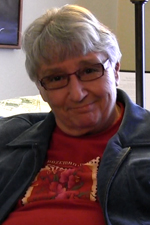
Mina McDaniel Oral History Interview
Life history interview conducted by Janice Dilg.
December 1, 2015
Mina McDaniel (b. 1944) earned both bachelor's and master's degrees from OSU in Food
Science and Technology. A sensory scientist, McDaniel returned to her alma mater in
1983 to lead the OSU Sensory Science Laboratory, overseeing projects related to beer,
wine, and Asian noodles, among many other topics. McDaniel also emerged as an important
advocate for women on campus, and filled numerous roles in this capacity during her
years as a faculty member. She concluded her OSU career as Director of Academic Programs
and Academic Assessment before retiring in 2006. McDaniel's interview provides a detailed
account of campus life and the Food Science student experience in the 1960s. McDaniel
also discusses the arc of her own career; the activities of the Sensory Science Lab
during her years of association; and her sense of the changing status of women at
OSU over five decades.
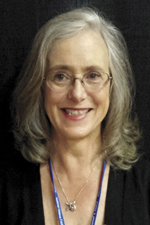
Starr McMullen Oral History Interview
Life history interview conducted by Chris Petersen.
September 4, 2015
Starr McMullen (b. 1951) was a member of the OSU Economics faculty from 1980 to her
retirement in 2014, serving as department chair from 2001 to 2005. An award-winning
scholar of transportation economics, McMullen has also served on the Oregon Governor's
Council of Economic Advisors since 2003. McMullen is likewise an accomplished violinist
and fiddler, who won the 2014 National Senior Fiddle Championship at the National
Oldtime Fiddle Contest. Her interview traces her work in economics; her institutional
memories of the Economics department at OSU; her perspective on the struggles that
women continue to face in academia; and her on-going pursuits as a musician.

David Noakes Oral History Interview
Life history interview conducted by Chris Petersen.
June 4, 2015
David Noakes (b. 1947) is a professor of Fisheries and Wildlife at OSU as well as
director and senior scientist at the Oregon Hatchery Research Center (OHRC). Noakes
came to Oregon State in 2005 after a long and distinguished career at the University
of Guelph in Ontario, Canada, where he developed an international reputation as a
scholar of fish behavior, evolution and genetics. Under Noakes' leadership, the OHRC
engages with researchers from around the world as well as local groups in exploring
the relationship between hatchery raised fish, wild fish, and the environment. Noakes'
interview focuses on his upbringing and education in Canada, his academic work in
fish behavior, and the on-going work of the OHRC.

Gloria O'Brien Oral History Interview
Life history interview conducted by Chris Petersen.
October 13, 2016
Gloria O'Brien (b. 1960) is a Biological Science Technician in OSU's Department of
Greenhouse Operations who has worked at Oregon State since 2008, specializing in integrated
pest management. O'Brien is also actively involved with sub-local 083 of the statewide
Service Employees International Union, serving for many years as a union steward and
also completing a four-year term as president of the sub-local from 2010-2014. In
2015, O'Brien also became an OSU alumna, after earning a degree in Horticulture that
she began pursuing, on a part-time basis, some seventeen years before. Her interview
provides insight into union activities on campus, the issues facing classified workers
across Oregon, and the roles filled by the Department of Greenhouse Services at Oregon
State University.

The OSU Extension Service Centennial Oral History Collection
Sixteen life history interviews conducted by Elizabeth Uhlig.
August 2007 - June 2009
In anticipation of its centennial in 2011, the Oregon State University Extension Service
interviewed several of its emeritus faculty in 2007, 2008, and 2009. These interviews
help to tell the story of Extension in Oregon over a fifty-year period following World
War II, and cover topics including agriculture, 4-H, home economics, energy, community
development, Sea Grant, communications, administration, and support. The interviewees
who are included in the collection that is presented here are: Roberta Anderson, Len
Calvert, Dean Frischknecht, John Hansen, Bob Jacobson, Duane Johnson, Alberta Johnston,
Harold Kerr, Glenn Klein, Linda Modrell, Owen Osborne, Jack Ross, Jane Schroeder,
Walt and Sally Schroeder, Greg Tillson, and Tom Zinn.

Erwin Pearson Oral History Interview
Life history interview conducted by Chris Petersen.
July 8, 2016
Erwin Pearson (b. 1932) graduated from Oregon State College in 1954 with a bachelor's
degree in Animal Husbandry. Following a career in private veterinary practice that
spanned nearly two decades, Pearson earned a master's degree from the OSU College
of Veterinary Medicine and later joined its faculty, working primarily in the college's
teaching hospital. A full-time member of the faculty for eighteen years, Pearson spent
an average of 1,200 hours per year teaching practical veterinary medicine to OSU's
Vet Med students, and also established himself as an expert on the impact of different
toxins on animal livers. In addition, Pearson chaired the college's curriculum committee
for many years and was central to the creation and implementation of a new organizational
plan that was put into place once Vet Med had secured funding for a full four-year
program at OSU. His interview touches upon his student experience and his years in
private practice, but is more centrally focused on the sometimes tumultuous history
of OSU's College of Veterinary Medicine.
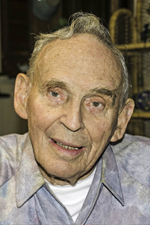
Bob Schoning Oral History Interview
Life history interview conducted by Mike Dicianna.
November 5, 2014
Bob Schoning (b. 1923) spent over fifty years working as a fisheries biologist and
policymaker at various levels of government. A nationally ranked handball player for
much of his life, Schoning also served his country as a Marine during World War II
and the Korean War, and was honored with the Bronze Star for his courage on the battlefield.
As director of the National Marine Fisheries Service, Schoning was heavily involved
with the crafting of the Magnuson-Stevens Fishery Conservation and Management Act,
an important piece of legislation which established a 200-mile fishery conservation
zone buffering the shorelines of the United States. Schoning spent four years as a
visiting professor with OSU's Fisheries and Wildlife Department and another sixteen
years on the advisory board of the Coastal Oregon Marine Experiment Station. His interview
focuses on his military service; his work as a fisheries policymaker; and his multiple
associations with OSU.

Larry Sidor Oral History Interview
Life history interview conducted by Tiah Edmunson-Morton.
November 6, 2015
Larry Sidor (b. 1950) is a 1972 graduate of Oregon State University in Food Science.
He has since established himself as a leading brewer in the Pacific Northwest, having
spent twenty-three years working in various capacities at the Olympia Brewing Company,
followed by stints as brewmaster at the Deschutes Brewery in Bend, and now at the
Crux Fermentation Project, which he founded in 2013. Sidor's father was an OSU Extension
Agent, and in his interview, Sidor reflects on the impact that was made upon him by
his exposure to his father's work. He likewise recalls his memories of the undergraduate
academic experience in Food Science at OSU in the early 1970s; traces his long and
influential career in the brewing industry; and shares his thoughts on the future
of craft brewing in the Northwest and nationwide.

Dick Smiley Oral History Interview
Life history interview conducted by Chris Petersen.
November 21, 2014
Dick Smiley (b. 1943) was a Professor of Plant Pathology at the Columbia Basin Agricultural
Research Center (CBARC) for nearly thirty years, and served as director of the branch
from 1985 to 2000. CBARC is located just outside of Pendleton, Oregon, and the research
and extension work conducted there serves eastern Oregon's farmers and ranchers, and
focuses primarily on agricultural concerns related to wheat and other dry land crops.
Smiley created the region's first plant pathology research program when he arrived
at the station in 1985, and later conducted important work on the impact of nematodes
on area crops. His interview focuses on his scientific research in soils and plant
pathology, and his institutional memories of life, work and community engagement in
Oregon's wheat country.

Fred Stormshak Oral History Interview
Life history interview conducted by Chris Petersen.
December 22, 2015
Fred Stormshak (b. 1936) is a Distinguished Professor Emeritus of Animal Sciences
who was a member of the OSU faculty from 1968 to his retirement in 2001. Stormshak
spent much of his career at Oregon State studying the ovary and uterus of the domestic
animal, with particular attention paid to the functioning of the corpus luteum, an
ephemeral and short-lived gland that plays a crucial role in the reproductive process.
In 1996, he and a colleague began a program of research on the biological basis of
male-oriented behavior in rams; work that eventually made headlines around the world.
Funded by the NIH and continuing to this day, the studies have focused on a group
of neurons in the anterior hypothalamus that may play a crucial role in the scientific
understanding of sexual behavior in sheep. Stormshak's interview details his upbringing
in rural Washington; his education in Dairy Science and Endocrinology; the broad array
of research that he has conducted at OSU; and his institutional memories of Animal
Science at OSU.

Dale Story Oral History Interview
Life history interview conducted by Chris Petersen.
January 9, 2014
Dale Story (b. 1942) overcame polio as a child and developed into an elite distance
runner, breaking the national high school record for the one-mile run in 1959. Story
attended Oregon State as an undergraduate from 1961-1965. During that time, he set
numerous school records as a cross country and track athlete, often training and competing
barefoot. Perhaps the pinnacle of Story's collegiate career came in 1961 when he won
the NCAA cross country championship, leading OSC to the team title at that same event.
The Story oral history interview focuses on his upbringing in California, his athletic
achievements and extracurricular interests at Oregon State, and his lifelong passion
for the outdoors.

Bernadine Strik Oral History Interview
Life history interview conducted by Mike Dicianna.
August 21, 2015
Bernadine Strik (b. 1962) is an OSU Professor of Horticulture who has been a member
of the Oregon State faculty since arriving in 1987. In addition to her Extension,
research and teaching appointment within the Department of Horticulture, Strik is
the Berry Crops Research Leader at the North Willamette Research and Extension Center
in Aurora, Oregon. Recognized internationally as an expert on numerous berry crops,
Strik's research and Extension programs have directly impacted crop yields and diversification
in the Pacific Northwest through her work on plant physiology and nutrition, as well
as crop production and harvesting systems. Her interview traces her broad and active
program of research while at OSU, and her deep connection to furthering the Land Grant
mission in Oregon.
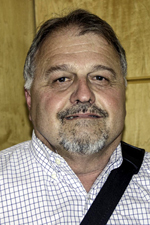
John Talbott Oral History Interview
Life history interview conducted by Mike Dicianna.
June 29, 2015
John Talbott (b. 1955) has been the director of the Sun Grant Western Regional Center
at OSU since arriving on campus in 2011. Under his leadership, Sun Grant has facilitated
important scientific research on biofuels, life cycle analysis, and bioproduct conversion
processes, all projects that seek to improve environmental sustainability while also
contributing to a more diversified agricultural and industrial economy. Since 2013,
Talbott has also served as Assistant Director of the Oregon Agricultural Experiment
Station, managing the grant processes, work plans, and research emphases for Experiment
Station faculty across the state. His interview provides an overview of his career
in carbon sequestration and environmental sustainability, and details the mission
and activities of Sun Grant at OSU from its inception up to present day.

Robert Tanguay Oral History Interview
Life history interview conducted by Chris Petersen.
April 21, 2017
Robert Tanguay (b. 1966) is a Distinguished Professor of Molecular Toxicology who
joined the OSU faculty in 2003. The Director of the Sinnhuber Aquatic Research Laboratory,
Tanguay has built an international reputation for his use of zebrafish as a model
for analyzing the toxicological impact of thousands of different chemical compounds.
In 2009, his laboratory received a major grant from the Environmental Protection Agency
that was used to conduct the largest in vivo toxicological study to date - an examination
of some 1,200 compounds yielding data on half a million zebrafish. Tanguay also speaks
regularly to both public and private entities on the biosafety of various commercial
developments, including flame retardants and the practice of fracking. His interview
traces his career in science with particular attention paid to his zebrafish studies
at OSU.

Bryan Wolfe Oral History Interview
Life history interview conducted by Chris Petersen.
October 31, 2014
Bryan Wolfe (b. 1944) is a farmer and rancher whose family has worked lands in eastern
Oregon for five generations. A 1966 OSU graduate in Agricultural Economics, Wolfe
has devoted his entire adult life to agricultural concerns, based primarily in the
Hermiston area. The founder of the Wolfe Feedlot and the W. Bryan Wolfe Ranch, Wolfe
has also served on the Umatilla Energy Cooperative Board of Directors, the Oregon
Board of Forestry, and the Oregon Energy Facility Siting Council. His interview concentrates
on the rich tradition of agriculture in the Wolfe family, his experiences as an OSU
student, the expansion and diversification of the family's agricultural operations,
and his own civic engagement both locally and regionally.
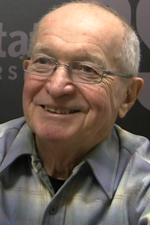
Ron Wrolstad Oral History Interview
Life history interview conducted by Chris Petersen.
December 14, 2015
Ron Wrolstad (b. 1939) is a Distinguished Professor Emeritus of Food Science and Technology
who attended Oregon State College as an undergraduate and was an active member of
its faculty from 1965 to his retirement in 2004. An accomplished and highly cited
agricultural scientist, Wrolstad has made important contributions to the study of
fruit juice adulteration, ultimately becoming a trusted authority on the subject and
receiving funding from both public and private sources to act as a check on fruit
juice producers worldwide. Wrolstad likewise contributed to the body of research on
natural colorants, including a project investigating the use of radish extract to
achieve the red color associated with maraschino cherries. In his interview, Wrolstad
reflects on his undergraduate years at OSC; comments on the legacy of maraschino cherry
work at Oregon State; details the themes of his research over time; and shares his
institutional memories of a sixty-year association with the Food Science and Technologies
Department.

Russ Youmans Oral History Interview
Life history interview conducted by Mike Dicianna.
May 7, 2015
Russ Youmans (b. 1936) joined the OSU faculty in 1966 as a researcher and Extension
liaison operating out of the Agricultural Economics department. From 1977 to his retirement
in 1999, Youmans headed the Western Regional Development Center (WRDC), a federally
funded organization based at OSU and charged with linking land grant universities
with local policymakers to more effectively address issues of socio-economic development
in rural communities. As director, Youmans oversaw a wide swath of activities focusing
on, among other issues, health care, economic progress, and leadership education in
rural areas all across the western United States. His interview recounts his own rural
upbringing and education in agricultural economics; the creation and mission of the
WRDC; and the many activities with which he was involved as center director.
